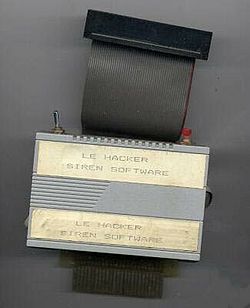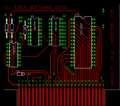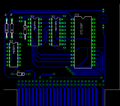Difference between revisions of "Hackit"
m (Siren Software Hacker moved to Hackit: correct name for original product) |
Cpcmaniaco (Talk | contribs) (→Weblinks) |
||
| (19 intermediate revisions by 8 users not shown) | |||
| Line 1: | Line 1: | ||
| − | + | Hackit was a reasonably simplistic, but effective hacking device produced by [[Siren Software]]. | |
| − | + | The french version was called '''Le Hacker''', sometimes also referred to as '''Le Hackeur''', distributed by [[Duchet Computers]]. | |
| − | + | [[Image:Le hacker.jpg|right|thumb|250px|Siren Software Hacker "Le hacker" - the version of Hackit exported to France.]] | |
| + | |||
| + | == How it worked == | ||
| + | |||
| + | Though Hackit's hardware was much less advanced than Romantic Robot's [[Multiface]], it was very useful in some circumstances. | ||
| + | |||
| + | Hackit consisted simply of a single sideways ROM, with an enable switch, and a reset button. | ||
| + | |||
| + | Enabling the switch would turn the ROM on; the user could then reset the CPC, and Hackit would run when it was initialised, rather than passing control to BASIC. | ||
| + | |||
| + | This had the disadvantage that the firmware and screen memory would be reinitialised, potentially wiping some of the code you wished to hack. | ||
| + | |||
| + | However, memory from &0040 to &AF00 was preserved, as was the second 64k on 128k machines. | ||
| + | |||
| + | Hackit then presented a mode 2 command-line interface offering a range of useful hacking tools, including a disassembler, a (slow!) graphical overview of memory, a memory editor, a 'find bytes' function, and save/load commands. | ||
| + | |||
| + | It was coded and designed by [[Simon Cobb]], the owner of [[Siren Software]]. | ||
| + | |||
| + | Hackit was exported to France and found significant success under the name 'Le Hacker'. | ||
| + | |||
| + | Frustration at the slow speed and erratic operation of Hackit caused some members of [[STS]] to start work on replacement ROM software, [[Doctor Fegg's Hack-Pack]] and [[Amigo]] (the Executioner), but neither was ever finished. | ||
| + | |||
| + | Now, thanks to Jose Leandro, the hardware specialist of the spectrum, with his famous page : | ||
| + | |||
| + | http://trastero.speccy.org/cosas/JL/JL.htm | ||
| + | |||
| + | We can know more about this hardware. | ||
| + | |||
| + | == Manual == | ||
| + | |||
| + | [[Media:Hackit Manual.pdf|Hackit (Siren Software) Manual]] {{EN}} {{PDF}} | ||
| + | |||
| + | == Utilities designed for use with Hackit == | ||
| + | |||
| + | * [[Soundhakker]] | ||
| + | |||
| + | == Pictures == | ||
| + | |||
| + | <gallery> | ||
| + | |||
| + | image:hacker-top.jpg|PCB Top side | ||
| + | image:hacker-bot.jpg|PCB Bottom side | ||
| + | image:HackIt_Top.jpg|Top view | ||
| + | image:HackIt_Bottom.jpg|Bottom view | ||
| + | image:HackIt_PCB_Top.jpg|PCB Top | ||
| + | image:HackIt_PCB_Bottom.jpg|PCB Bottom | ||
| + | |||
| + | </gallery> | ||
| + | |||
| + | <gallery caption="Hackit Layout, thanks to Jose Leandro"> | ||
| + | |||
| + | File:Hackit PCB Front.png|Hackit - PCB Front | ||
| + | File:Hackit PCB Back.png|Hackit - PCB Back | ||
| + | File:Hackit Layout.png|Hackit - Layout | ||
| + | |||
| + | </gallery> | ||
| + | |||
| + | == Download == | ||
| + | |||
| + | * [[Media:HackItV4.zip|HackIt ROM v4.00 (EN)]] | ||
| + | * [[Media:HACKEUR.zip|HackIt ROM v4.79 (FR)]] | ||
| + | * [[Media:HackItV7.zip|HackIt ROM v7.00 (FR)]] | ||
| + | |||
| + | * [[Media:Hackit (eagle).zip|Hackit (Eagle).zip]] (Hackit files for Eagle) | ||
== Weblinks == | == Weblinks == | ||
| − | [http:// | + | * [http://www.cpc-power.com/index.php?page=detail&num=9323 ''Hackit'' from CPC-Power] |
| + | * [https://cpcrulez.fr/hardware-interface_debug-hackit.htm ''Hackit'' from CPCrulez] | ||
| + | * [http://hardware.speccy.org/temp/Amstrad-Siren.html ''Hackit'' from hardware.speccy.org] | ||
| + | * [http://8bit.yarek.pl/interface/cpc.hacker/index.html Section about hackit in 8bit Projects for Everyone] | ||
| − | [[Category:Peripherals]] | + | [[Category:Copy Protection]] [[Category:Peripherals]] [[Category:Manual]] [[Category:DATA Storage]] |
Latest revision as of 06:44, 17 September 2020
Hackit was a reasonably simplistic, but effective hacking device produced by Siren Software.
The french version was called Le Hacker, sometimes also referred to as Le Hackeur, distributed by Duchet Computers.
Contents
How it worked
Though Hackit's hardware was much less advanced than Romantic Robot's Multiface, it was very useful in some circumstances.
Hackit consisted simply of a single sideways ROM, with an enable switch, and a reset button.
Enabling the switch would turn the ROM on; the user could then reset the CPC, and Hackit would run when it was initialised, rather than passing control to BASIC.
This had the disadvantage that the firmware and screen memory would be reinitialised, potentially wiping some of the code you wished to hack.
However, memory from &0040 to &AF00 was preserved, as was the second 64k on 128k machines.
Hackit then presented a mode 2 command-line interface offering a range of useful hacking tools, including a disassembler, a (slow!) graphical overview of memory, a memory editor, a 'find bytes' function, and save/load commands.
It was coded and designed by Simon Cobb, the owner of Siren Software.
Hackit was exported to France and found significant success under the name 'Le Hacker'.
Frustration at the slow speed and erratic operation of Hackit caused some members of STS to start work on replacement ROM software, Doctor Fegg's Hack-Pack and Amigo (the Executioner), but neither was ever finished.
Now, thanks to Jose Leandro, the hardware specialist of the spectrum, with his famous page :
http://trastero.speccy.org/cosas/JL/JL.htm
We can know more about this hardware.
Manual
Hackit (Siren Software) Manual ![]()
![]()
Utilities designed for use with Hackit
Pictures
- Hackit Layout, thanks to Jose Leandro
Download
- Hackit (Eagle).zip (Hackit files for Eagle)









